Finding the right project manager can make or break your data science project. For example, maybe you’ve already hired a team of data scientists, and they’re ready to get to work. However, understanding how to hire data scientists effectively ensures you’ve built a strong foundation for success.
But before they dive into the project, you realize you need a project manager to help oversee the work. This person will be responsible for coordinating the team, keeping track of timelines, and communicating progress to stakeholders. Without the right project manager, your data science project could quickly derail.
This guide will show you what to look for when hiring a project manager so you can find the right person for your project.
Responsibilities of Project Managers

Defining the Project Goals and Creating a Roadmap
Every project starts as an idea. A project manager’s responsibility is to work with internal stakeholders and external clients to define that concept and create a process to bring it to fruition. This includes setting and managing client expectations, developing a detailed project plan, defining the project’s scope, understanding project risks, and assigning team members to specific tasks.
Assembling the Project Team
Project managers are accountable for every aspect of the project, including leading a team capable of meeting or exceeding client expectations for their vision. Successful project managers assemble and manage these individuals to make a fine-tuned project machine. If the team needs guidance, training, or coaching, a project manager must set them up for success. To build and maintain a dynamic team mentality, a project manager must be able to keep open and honest communication, form working relationships, and motivate anyone who needs it.
Monitoring Progress and Keeping the Project on Track
Organization and follow-through are a big part of a project manager’s role. From creating an accurate timeline of project completion to ensuring tasks are finished within the confines of the assignment, the project manager must remain aware of how the project is progressing. The project manager also anticipates delays that may occur on the client side and apprises the team of any changes in the client’s needs.
Problem Solving and Overcoming Challenges
During every project, issues arise that need to be solved. The project manager is the first person to whom clients and team members turn when something goes wrong, so it is in these professionals’ best interest to anticipate any potential hiccups before they happen. Adaptability and problem-solving are key to keeping control of a project. One issue that project managers need to have a plan for is change or expansion in a project’s deliverables throughout a project, also known as scope creep. This usually occurs when the scope of a project isn’t correctly defined from the start, and it can seriously affect the budget and ability to deliver on time.
Managing the Budget
Budget management is another primary project manager’s duty. These professionals make sure that the project gets done without excessive spending. A good project manager has mastered the art of cost efficiency. Project managers must also be transparent and realistic about the cost so clients know how much they are likely to spend from the beginning.
Stakeholder Communication and Satisfaction
Project managers have the closest relationship with clients of anyone who works on a project. Because of this, they must keep open lines of communication for updates and feedback. If any issues or changes arise in the timeline of a project, for example, the project manager is in charge of keeping the client up to date.
Project Closure and Evaluation
After a project is finished, the project manager is responsible for evaluating its efficiency and effectiveness. With the data they’ve tracked throughout the process, they can begin to identify shortcomings and plan for ways to fix similar issues in the future. This is also an opportunity to highlight what went right, including building camaraderie and rewarding team members who excelled during the project.
Related Reading
- Scrum Master Roles and Responsibilities
- Solution Architect Roles and Responsibilities
- Project Executive vs Project Manager
- How to Hire a Project Manager
- Mistakes to Avoid When Hiring Developers
- What to Ask When Hiring a Data Scientist
What to Look for When Hiring a Project Manager


Internal Versus External Hiring: Which Type of Candidate Is Best for Your Team?
When hiring a project manager, the first option to consider is whether you want to promote someone from within or bring in an external hire. For creative agencies, this may be a developer or a designer. Hiring a project manager from within minimizes the onboarding process, as the individual already understands the culture and needs of the organization.
This person may already have established relationships with the individuals and vendors they will be working with and can easily direct your internal resources. However, bringing a project manager on as an external hire can also have its benefits.
While your company culture may be well-established, an external hire can bring new ideas and objectivity to the project. They may have a fresh perspective on your strategies that have not been brought to the table yet and access to resources outside of your standard vendors.
Task Management and Delegation
One of the strongest skills a project manager can have is sorting through the strengths and weaknesses of each person on the team. By profoundly understanding who is best at what, the project manager can delegate responsibilities to the correct employees to get the project done most efficiently and successfully.
Great Communication
Earlier this year, Zety compiled the skills most mentioned on project manager resumes. Two top three skills were communication (seen on 18% of the resumes) and leadership (seen on 17%). Communication is another skill that may seem obvious, but good communication is truly essential for a successful project manager. They’ll wear many hats and dip their toe across multiple teams, so clear communication will keep the project organized. If a deadline is missed, a change has to be made, or something isn’t yet approved, the project manager needs to be able to communicate this across the teams and to each manager involved.
Leadership Skills
It’s not surprising that leadership was one of the top three skills, considering that many of the people the project manager will be working with will look to them for guidance and solutions while the project is being completed. For employees to easily take direction, they must also trust and respect the project manager as a capable leader.
Ability To Move Projects Forward and Create a Schedule
Any project management role will involve a fair amount of logistical work, which means that the ideal project manager can develop a schedule for each team member and know what each project day involves. This includes billing due dates, scheduling meetings that work with team members’ availability, task deadlines, and more.
If the project manager handles multiple projects, perhaps for several clients, they must also be proficient at capacity planning and balancing available resources against other commitments. If a due date is missed, it’s essential that the project manager does not stress and instead can shift around the schedule to make the change work.
Problem-Solving Skills
That brings us to problem-solving. Challenges happen, due dates are missed, budgets go over, and employees don’t get along or get sick. There are endless hurdles to overcome when you’re running a business, but a project manager should be able to react swiftly during times of conflict. If you find a candidate who can think on their feet and figure out a solution for any challenge, don’t let them go.
Negotiation, Relationship, and Team-Building Skills
When challenges arise, part of the solution may require negotiation or team-building efforts. A pricing quote provided at the project’s beginning is now higher, throwing the bottom line off. A team that was supposed to have a deliverable to you by a specific date is a week late. Whatever the challenge, the project manager should be able to solve the issue with poise and ease, negotiate a solution, and build strong relationships within and with vendors.
Azulity specializes in healthcare master data management and provider credentialing services, bringing proven expertise in implementing healthcare data solutions and credentialing across the US. Our comprehensive platform ensures consistent patient, provider, location, and claims data synchronization across all systems and departments.
Key features include healthcare MDM, provider MDM, reference data management, credentialing, and provider enrollment. We serve healthcare technology leaders – from CIOs and CDOs to VPs of data platforms and credentialing – helping them eliminate the costly problems of fragmented data systems. Book a call to learn more about our healthcare master data management services today!
5 Tips for Hiring the Best Project Manager


1. Leverage Azulity for Informed Hiring
Azulity focuses on healthcare master data management and provider credentialing services, offering expertise in healthcare data solutions and credentialing across the US. Their platform synchronizes patient, provider, claims, and location data across all departments and systems. Key features include provider MDM, reference data management, credentialing, and healthcare MDM.
Azulity serves healthcare technology leaders, helping them eliminate the costly problems of fragmented data systems. Book a call to learn more about their healthcare master data management services today!
2. Research Project Managers in Your Industry
Since project manager is a title in many industries, researching the responsibilities, qualifications, and salaries for sectors you don’t work in won’t be helpful. Your research should cover what applies to your company’s project manager’s work.
3. Be Prepared to Pay for Experience
In many industries, a project manager is a title that people work up to after years of experience so that qualified project managers may have extensive experience in their industry. This might cost you more money for a salary, but it’s worth it if they have the skills and expertise you need.
4. Understand the Certifications
Project managers may have specialized certifications or training in specific methods, especially software development. If your industry is one of these, you want to understand these certifications, how they affect project management, and what might work best for your company.
5. Consider Freelance or Contract Project Managers
Hiring a permanent, full-time project manager may not make sense for some companies. Instead, you could hire a freelance or contract project manager who is only paid to work on one specific project from beginning to end. This could be more cost-effective for some organizations.
Related Reading
- Data Architect Roles and Responsibilities
- Quality Analyst Interview Questions
- Quality Analyst Skills
- Data Architect Vs. Data Engineer
- Skills Required for Project Manager
- Questions to Ask When Hiring a Programmer
- How to Hire a Software Developer
- How to Hire Programmers for a Startup
- Data Architect Skills
- Scrum Master vs Project Manager
- Hiring Dedicated Developers vs In-House Developers: What Is Better?
- Data Analyst Skills Needed
11 Best Project Management Tools
1. Azulity: The Healthcare Master Data Management Platform
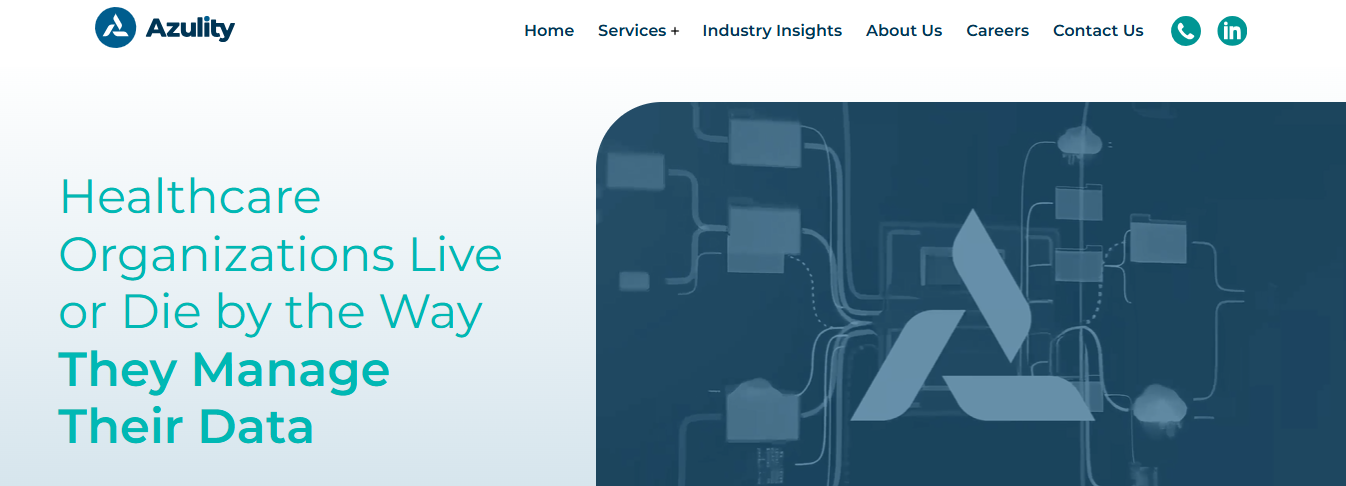

Azulity focuses on healthcare master data management and provider credentialing services. Their healthcare data solutions help eliminate the costly issues of fragmented data systems and ensure consistent synchronization of patient, provider, location and claims data across all systems and departments. Key features include healthcare MDM, provider MDM, reference data management, credentialing, and provider enrollment. Azulity serves healthcare technology leaders – from CIOs and CDOs to VPs of data platforms and credentialing.
2. Asana: A Popular Choice For Project Management


Asana is a popular project management software that helps teams organize projects, tasks, and communications. It features a simple interface with many customization options and project views, including a Kanban board. Asana can be a perfect solution for cross-functional teams that work with agile methodologies, such as website project development companies. However, agencies with more robust needs might find that certain features, especially regarding budgeting and financial performance, could be more developed.
Pros
- It offers a free plan. Asana, as a project management software, is primarily concerned with helping small and medium-sized businesses. However, it is not limited to it. Thanks to its free plan, small teams on a tight budget can still have access to affordable project management software.
- Several integrations. This feature more than makes up for Asana’s lack of some features. Several third-party apps and software can be integrated with Asana, including Salesforce, Slack, Dropbox, Google Calendar, and a lot more.
- Time tracking. The Asana app also helps companies and teams see where their time is spent. Jobs, tasks, and responsibilities are all sorted into different projects, ensuring you won’t overlook anything.
Cons
- We know new users have a hard time understanding the Asana interface. With new users in mind, we’ve created an online tutorial to help guide users through the software and ensure they aren’t intimidated by the interface.
- Asana is not ideal for small teams or single projects: It has overloading features, and it becomes overwhelming for a fundamental project. When you add new features, you have to balance the complexity of the application, and that’s where the problems start to happen.
3. Wrike: The Tool for Creative Teams
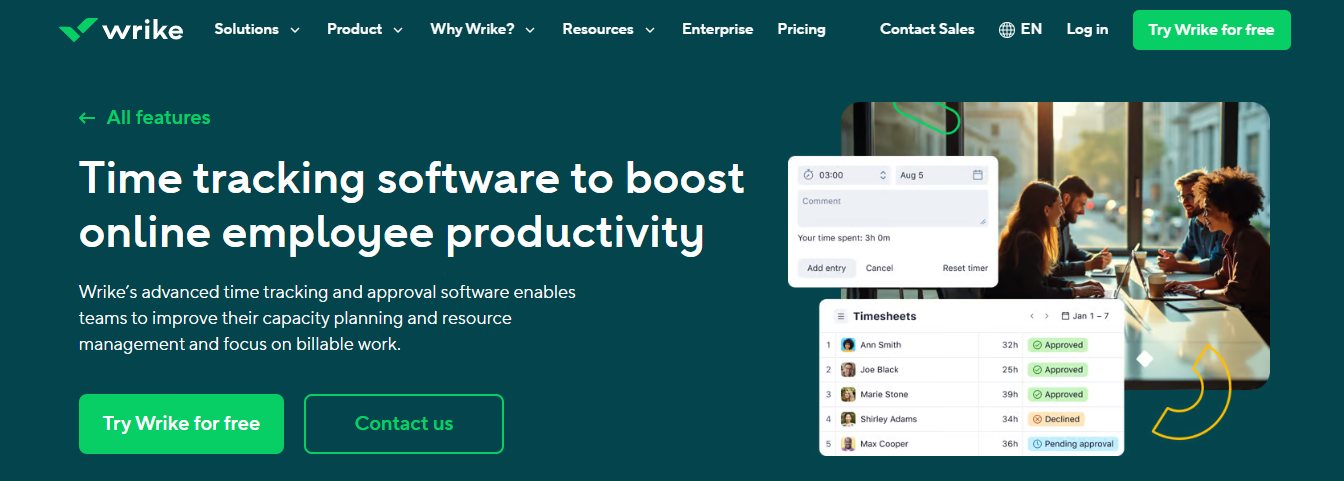

Wrike is a powerful work management platform built for teams and organizations looking to collaborate, create, and exceed daily. Wrike’s solution for agencies creates a central hub that allows teams to monitor all client projects and resources in one place, improve workflow, and track progress. Key features include real-time collaboration, time tracking, cross-tagging for complete visibility, proofing and approvals, resource management, insights, and analytics. Wrike is where agencies unite to delight their clients by completing more projects in less time.
Pros
- Unlimited projects in a free account
- Unlimited subtasks with unlimited levels of nesting
- Kanban, Calendar, and Table views
- Unique customization for marketing/creative teams and professional services
- 20 free external collaborators
Cons
- Gantt chart view is available only in paid plans
- An in-app timer for time tracking is only available on Business plans or higher
4. ClickUp: The Versatile Project Management Tool
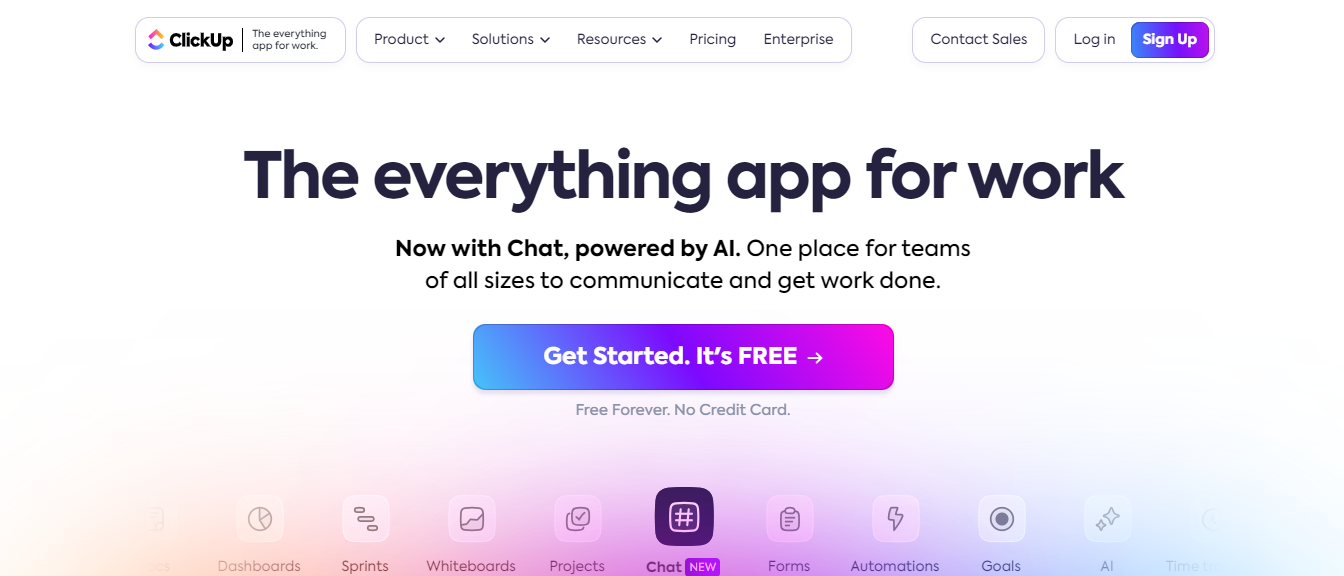

I tested ClickUp’s Free plan to explore its features and capabilities. This marketing project management software provides a centralized hub for handling sprints and adjusting to evolving project requirements. Whether it’s campaign tasks, resources, or deadlines, everything’s in one place for easy access. I liked the freedom to set weekly, monthly, quarterly, or yearly goals. Tracking progress became significantly easier with different project views, including Kanban boards that enhance task visibility. I could schedule daily tasks and reminders to stay on top of project deadlines. Adding to that, custom widgets made it possible to measure ROI efficiently.
Pros
- You can streamline affiliate sign-ups and requests from clients with ClickUp Forms.
- Access to Docs, wikis, and more for smooth team collaboration
- Resource management capabilities to track resource workload for best optimization
- Assigned Comments help establish clear task responsibilities
Cons
- It does not offer agile reporting in the free plan
- Too many features on the dashboard can overwhelm users
5. Airtable: A User-Friendly Project Management Tool
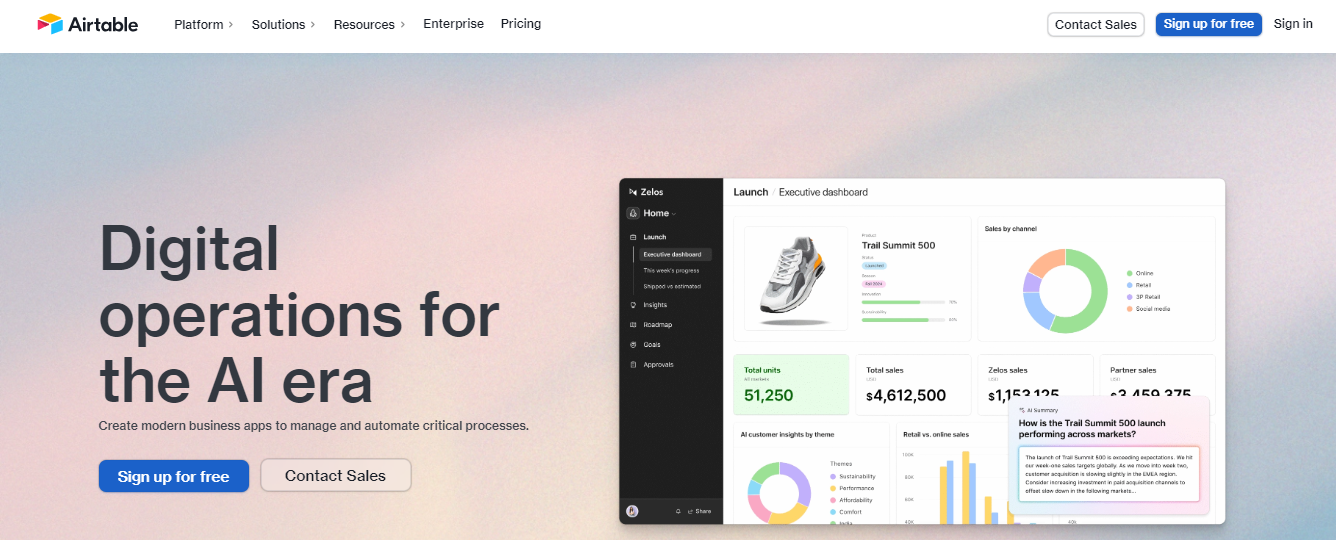

Airtable is a cloud-based collaboration and project management tool that combines an easy-to-use spreadsheet with the potential of a database and the flexibility of custom applications. With Airtable, small teams can create highly collaborative workspaces to work together on projects. The platform also integrates with other apps and services like Slack, Zapier, and Dropbox to provide a complete client management system for customer management.
Pros
- Actions to goals linking functionality to streamline reporting
- Shareable forms to populate records into the Airtable base
- Timeline View to track events, resources, and projects
- Automation with Javascript functionality
- Form View for contact management
Cons
- Limited sorting and filtering options compared to other client management software tools
- Limited customization options for workspace appearance
6. Brafton: The Content Marketing Platform


The Brafton Content Marketing Platform is a project management tool with one goal: to simplify content marketing for any organization or business. The Brafton Platform accomplishes this by streamlining any content team’s workflows, organizing marketing collateral in an easy-to-use system, and giving visibility into all past and current projects to all pertinent stakeholders.
Pros
- They cover multiple industries and have writers who are experienced in producing content for each of them.
- They are a one-stop shop for all of your marketing needs. They will create your marketing plan, make your content, and help you promote it.
- Brafton ensures that the content they produce for you is 100% unique and checked for plagiarism.
- Brafton guarantees that your content is formatted correctly and ready to publish immediately. You won’t have to worry about things like using the correct font sizes, headings, and if the layout is correct.
Cons
- The main downside of working with Brafton is that they charge much more than freelancer platforms and other marketing agencies. However, you have to weigh the extra cost against the quality of the content you will receive and the higher level of service you will receive.
- You can’t build direct relationships with any of the writers who produce your content as you deal with a client manager. This makes it difficult to bring your marketing operations in-house at a later date if you wish.
7. Jira: A Project Management Tool for Agile Teams


Jira is a flexible tool that fits well with marketing teams. It supports agile methods like Scrum and Kanban, which help manage marketing campaigns effectively. Its Sprints dashboard offered me a structured way to plan and execute marketing iterations for my company’s campaigns. I also used epics and stories to organize my marketing projects into manageable tasks.
Customization is another benefit. Jira can be adapted to your marketing team’s needs with custom fields, workflows, and issue types. Whether you’re a small team or a large enterprise, it scales easily to meet your unique marketing project and campaign requirements.
Pros
- Backlog feature to keep track of marketing tasks, ideas, and user stories
- Comments, notifications, and tags make it easier to communicate about tasks and projects
- Smooth integration with Trello, Confluence, and third-party apps from the Atlassian Marketplace
- Rich dashboard features to track and analyze your marketing project’s progress and performance
Cons
- Weak team chat functionality, such as struggling to connect with colleagues online via the platform
- It takes time to set up projects
8. Bonsai Agency Software
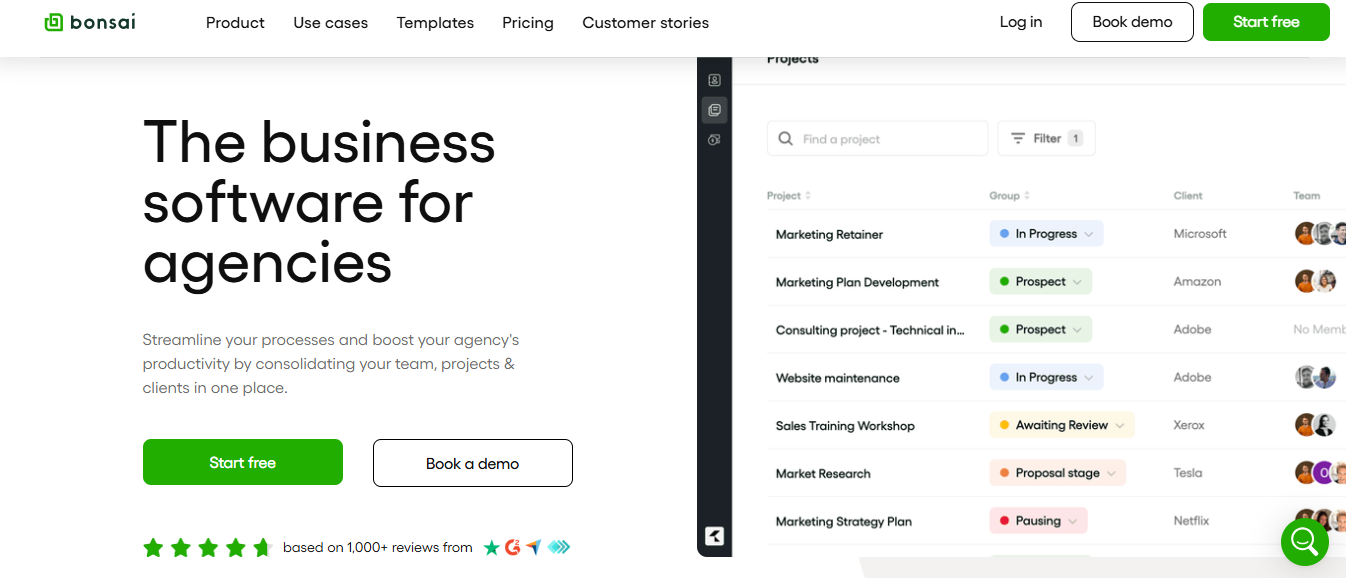

Bonsai Agency Software is an all-in-one agency management tool that simplifies agencies’ lives. It handles everything from project management to client collaboration so that you can focus more on the creative side and less on admin headaches. This integrated approach makes it easy to organize tasks, track progress, collaborate with both your team and clients, and give you a clear idea of how your agency is performing.
Bonsai also includes time tracking, client onboarding, resource management, and automated workflows to keep your operations running smoothly, ensuring projects stay on schedule and within budget. It offers various visual tools like Gantt charts, Kanban boards, and list views to help you stay organized and see everything at a glance.
Real-time reporting gives insights into profitability, resource utilization, and your agency’s overall health. Additionally, Bonsai simplifies the process of managing agency finances. You can track expenses, send invoices, and handle budgeting in one place. Bonsai is a solid pick if you’re looking for a tool to streamline your agency’s operations and boost productivity.
Pros
- User-friendly interface
- Client-centric focus
- Strong focus on small businesses
- Affordable pricing plans
- There is no need to switch between several tools as Bonsai offers an all-in-one approach
Cons
- Limited advanced project management features for larger enterprises
- Bonsai integrations are fewer compared to some competitors (although Zapier integration expands its possibilities)
- The mobile app could be further enhanced with additional features and functionality
9. Pipedrive: A Tool for Sales Teams
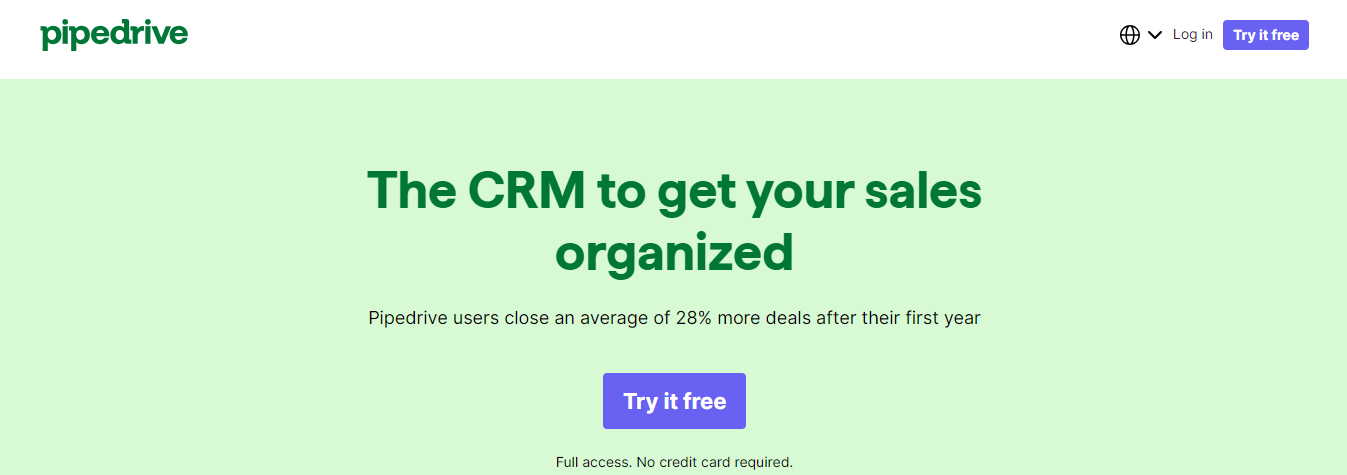

Pipedrive is a CRM system designed to help sales teams increase productivity and close more deals. It offers various features that help streamline the sales process, including contact management, email tracking, call logging, lead scoring, sales forecasting, and automated workflows. With Pipedrive, a sales team can quickly organize their leads, contacts, and deals to stay focused on the tasks that matter. The client management app allows users to easily create custom pipelines and automated emails to help nurture leads and increase conversions.
Pros
- Segment leads to create personalized, targeted communication
- Drag-and-drop interface to quickly update deal statuses
- Activity reminders and team collaboration
- Customizable web forms
- Revenue forecasting
Cons
- Limited customization for user permission settings compared to other free client management software
- Project scope and document management tools are paid add-ons.
10. Insightly: A CRM with Project Management Features


Insightly delivers a lot of bang for your CRM buck. It’s one of the easiest to use among the tested systems, even if it’s not quite as feature-rich as some. Importing data is a smooth process. Insightly’s built-in reporting engine is AI-powered, providing one-button data export to Microsoft Power BI.
Pros
- Smooth data input and sharing
- Slick interface that’s consistent and easy to pick up
- Highly customizable
- Easy integration with Insightly’s help desk and marketing apps
Cons
- Expensive high-end tiers
- Lacks advanced features like custom workflows
11. Confluence: A Team Documentation Tool


I found Confluence to be a fantastic tool for my team. It enabled us to create, edit, and organize documents and knowledge bases as a group. No matter where we were, we could all pitch in, which is especially handy for virtual teams. Take, for instance, the times I’ve used this feature extensively for our marketing efforts.
Whether crafting blog posts, coordinating social media campaigns, or putting together email newsletters, Confluence has been a lifesaver. It allows multiple team members to simultaneously work on the same document, leave comments, and track changes. All in all, it’s made collaboration a breeze for us.
Pros
- Mobile apps for iOS/Android allow team members to collaborate on the go, which is vital for virtual teams.
- Customizable workspaces where teams can create specific spaces for different projects, departments, or teams
- Access to various templates and macros that simplify everyday tasks, such as creating meeting notes, project plans, and product requirements
- Powerful search functionality makes it easy for team members to find the necessary information quickly.
Cons
- Some advanced features come at a premium price
- Occasional sluggishness and technical glitches
Book a Call to Learn More About Our Provider Credentialing Services
Before looking for a data scientist, it’s essential to determine what your organization needs. Data scientists have a broad skill set that can help organizations solve various problems. By identifying your goals early on, you can create a focused job description that attracts candidates with the skills needed to meet your objectives. For example, if you’re looking to improve patient outcomes by analyzing healthcare data, you might target a candidate with strong statistical skills and experience with healthcare data. On the other hand, if you want to develop a predictive model for your claims data, you might look for someone with strong programming skills and experience building similar models.
Create a Focused Job Description
Once you’ve outlined your goals, you can create a job description for a data scientist. This description should include specific details about your organization, the data science project(s), and the skills and qualifications needed to succeed. The more specific you are, the better your chances of attracting qualified candidates with the right expertise.
Consider including information about the healthcare data environment to help candidates understand the nuances of the job. For example, mention the types of data (e.g., claims data, clinical data) and the systems in use (e.g., electronic health records, health information exchanges).
Also, consider mentioning any data science tools the candidate will need to use or programs they should be familiar with. This will help you attract a candidate who is already comfortable with the software, as this will shorten the learning curve and get your project back on track quicker.
Cast a Wide Net
Data scientists are in high demand, and qualified candidates are few and far between. To improve your chances of finding the right fit for your organization, consider casting a wide net when you begin your search. Post your opening on multiple job boards, including those specializing in healthcare and data science positions. Also, consider sharing the opening with your professional network and on social media to attract passive candidates who may not be actively looking for a new job.
Don’t Skip the Technical Assessment
Data science is a vast field encompassing various skills and expertise. As such, it’s essential to understand that not all data scientists are the same. When hiring for your project, don’t skip the technical assessment. This will help ensure your candidate has the skills to get your project back on track. Consider including an assessment to gauge the candidate’s technical skills and problem-solving approach in your interview process. You can even tailor the evaluation to reflect the specifics of your data science project to gain insight into how the candidate will handle the work.
Look for Interpersonal Skills
Finally, while technical skills are vital to hire for a data science project, don’t overlook the importance of interpersonal skills. Data scientists are often tasked with working on teams and communicating their findings to stakeholders outside the data science field. Look for candidates with strong communication and collaboration skills to ensure they can work well with your existing staff and help you meet your organizational goals.
Related Reading
- Data Science Recruiters
- Best Recruiters for Product Managers
- Solution Architect Skills
- Turing.com Alternative
- Data Analyst Recruitment Agency
- Scrum Master Recruitment Agencies
- Lemon.io Alternative
- Scrum Master Skills
- Data Science Skills
- Honeypot.io Alternatives
- Dice.com Alternatives